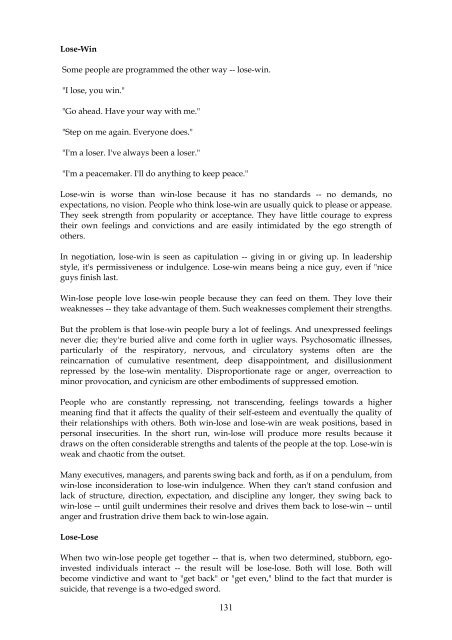Covey - The 7 habits of highly effective people
You also want an ePaper? Increase the reach of your titles
YUMPU automatically turns print PDFs into web optimized ePapers that Google loves.
Lose-Win<br />
Some <strong>people</strong> are programmed the other way -- lose-win.<br />
"I lose, you win."<br />
"Go ahead. Have your way with me."<br />
"Step on me again. Everyone does."<br />
"I'm a loser. I've always been a loser."<br />
"I'm a peacemaker. I'll do anything to keep peace."<br />
Lose-win is worse than win-lose because it has no standards -- no demands, no<br />
expectations, no vision. People who think lose-win are usually quick to please or appease.<br />
<strong>The</strong>y seek strength from popularity or acceptance. <strong>The</strong>y have little courage to express<br />
their own feelings and convictions and are easily intimidated by the ego strength <strong>of</strong><br />
others.<br />
In negotiation, lose-win is seen as capitulation -- giving in or giving up. In leadership<br />
style, it's permissiveness or indulgence. Lose-win means being a nice guy, even if "nice<br />
guys finish last.<br />
Win-lose <strong>people</strong> love lose-win <strong>people</strong> because they can feed on them. <strong>The</strong>y love their<br />
weaknesses -- they take advantage <strong>of</strong> them. Such weaknesses complement their strengths.<br />
But the problem is that lose-win <strong>people</strong> bury a lot <strong>of</strong> feelings. And unexpressed feelings<br />
never die; they're buried alive and come forth in uglier ways. Psychosomatic illnesses,<br />
particularly <strong>of</strong> the respiratory, nervous, and circulatory systems <strong>of</strong>ten are the<br />
reincarnation <strong>of</strong> cumulative resentment, deep disappointment, and disillusionment<br />
repressed by the lose-win mentality. Disproportionate rage or anger, overreaction to<br />
minor provocation, and cynicism are other embodiments <strong>of</strong> suppressed emotion.<br />
People who are constantly repressing, not transcending, feelings towards a higher<br />
meaning find that it affects the quality <strong>of</strong> their self-esteem and eventually the quality <strong>of</strong><br />
their relationships with others. Both win-lose and lose-win are weak positions, based in<br />
personal insecurities. In the short run, win-lose will produce more results because it<br />
draws on the <strong>of</strong>ten considerable strengths and talents <strong>of</strong> the <strong>people</strong> at the top. Lose-win is<br />
weak and chaotic from the outset.<br />
Many executives, managers, and parents swing back and forth, as if on a pendulum, from<br />
win-lose inconsideration to lose-win indulgence. When they can't stand confusion and<br />
lack <strong>of</strong> structure, direction, expectation, and discipline any longer, they swing back to<br />
win-lose -- until guilt undermines their resolve and drives them back to lose-win -- until<br />
anger and frustration drive them back to win-lose again.<br />
Lose-Lose<br />
When two win-lose <strong>people</strong> get together -- that is, when two determined, stubborn, egoinvested<br />
individuals interact -- the result will be lose-lose. Both will lose. Both will<br />
become vindictive and want to "get back" or "get even," blind to the fact that murder is<br />
suicide, that revenge is a two-edged sword.<br />
131


